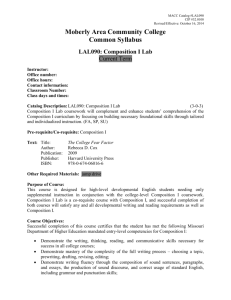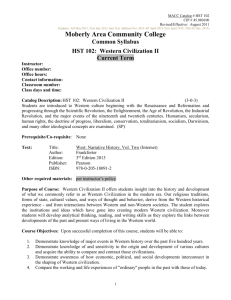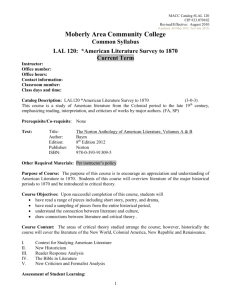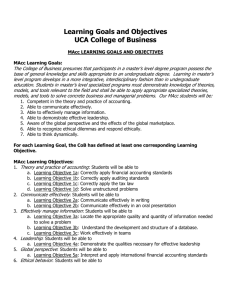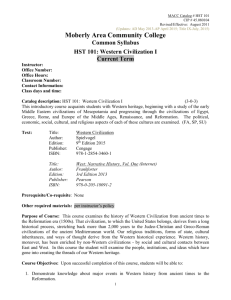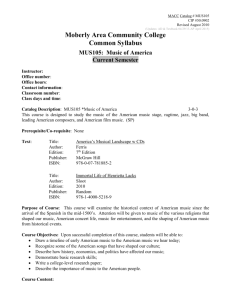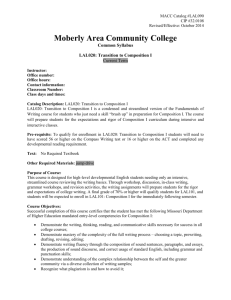HST 220 America on Screen I - Moberly Area Community College
advertisement
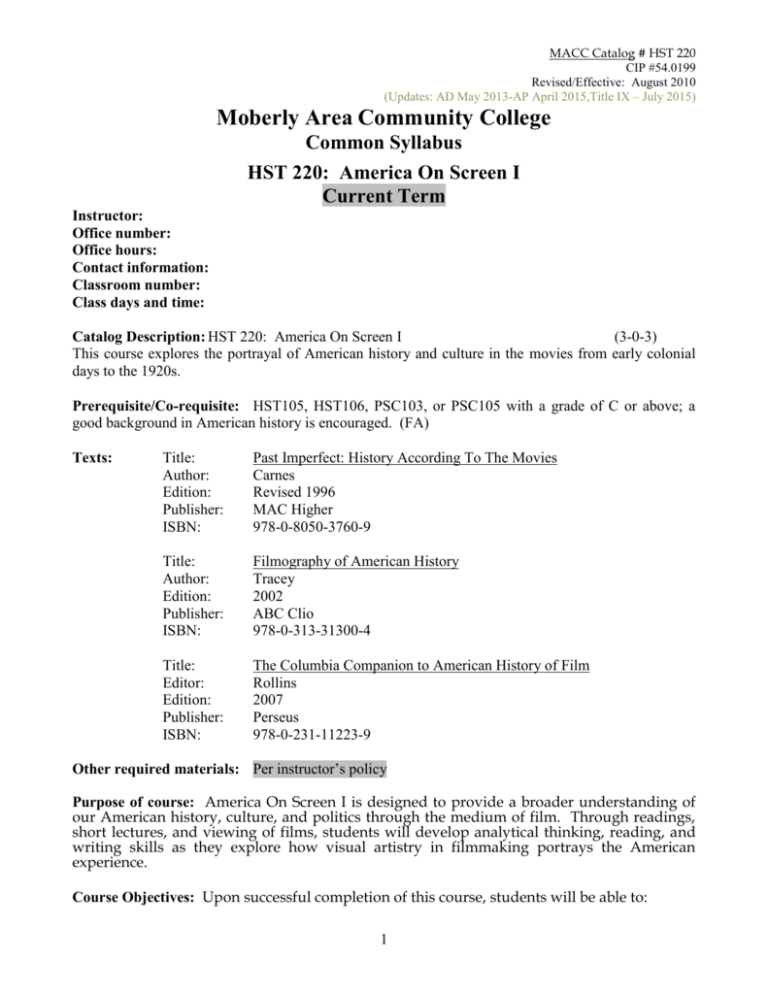
MACC Catalog # HST 220 CIP #54.0199 Revised/Effective: August 2010 (Updates: AD May 2013-AP April 2015,Title IX – July 2015) Moberly Area Community College Common Syllabus HST 220: America On Screen I Current Term Instructor: Office number: Office hours: Contact information: Classroom number: Class days and time: Catalog Description: HST 220: America On Screen I (3-0-3) This course explores the portrayal of American history and culture in the movies from early colonial days to the 1920s. Prerequisite/Co-requisite: HST105, HST106, PSC103, or PSC105 with a grade of C or above; a good background in American history is encouraged. (FA) Texts: Title: Author: Edition: Publisher: ISBN: Past Imperfect: History According To The Movies Carnes Revised 1996 MAC Higher 978-0-8050-3760-9 Title: Author: Edition: Publisher: ISBN: Filmography of American History Tracey 2002 ABC Clio 978-0-313-31300-4 Title: Editor: Edition: Publisher: ISBN: The Columbia Companion to American History of Film Rollins 2007 Perseus 978-0-231-11223-9 Other required materials: Per instructor’s policy Purpose of course: America On Screen I is designed to provide a broader understanding of our American history, culture, and politics through the medium of film. Through readings, short lectures, and viewing of films, students will develop analytical thinking, reading, and writing skills as they explore how visual artistry in filmmaking portrays the American experience. Course Objectives: Upon successful completion of this course, students will be able to: 1 MACC Catalog # HST 220 CIP #54.0199 Revised/Effective: August 2010 (Updates: AD May 2013-AP April 2015,Title IX – July 2015) Demonstrate knowledge of the impact of film both as a reflection of American culture and shaper of it. Explain reasons why “fact” and “fiction” are often intertwined in historical movies. Understand how films have portrayed various events, movements, and eras in American history and politics, including which time periods or events have received the most coverage, the least coverage, the most accurate coverage, and the least accurate coverage. Demonstrate basic skills in critical thinking and reading. Write college-level English. Course Content: I. Early history of film / Exploration of the role of film in shaping and reflecting cultural and historical realities II. The Colonial Experience / The American Revolution III. The Early Republic To 1865 / Wild West and Native Americans IV. The Civil War V. The Gilded Age / Dawn of the 20th Century VI. The Great War / Segregated Hollywood – Early Black Cinema VII. The 1920’s VIII. Amer. Politics & Authority / Ethnicity, Race, Religion in America Assessment of Student Learning: Student outcomes of the above objectives will be measured through interpretive essay assignments and essay examinations. Class participation is used only in determining borderline grades; this participation is measured by attendance and by participation in class discussions. Grading Scale: A = 90% 450 - 500 points B = 80% 400 – 449 points C = 70% 350 – 399 points D = 60% 300 – 349 points F = below 60% Below 300 points You are responsible for any assigned text material as well as lecture materials and videos for exams. I strongly encourage you to take notes. If you miss class, please see me or one of your classmates to find out what you missed. Although no pop quizzes are listed on the syllabus, they are always an option, so it pays to be prepared. Read your assigned text before coming to class; this will also help you to understand the material better. Description of Major Assignments / Projects: CLASS STRUCTURE: Each class will have 7 units of 2 weeks each. In weeks 2-15 of class, a film will be shown and discussed each class period (2 films per unit). Students will be given a list of the films to be shown on the first night of class. They must write interpretive essays on 4 of the films shown in class (one from each of four different units). They must also write essays on 3 more films not shown in class (one from each of the remaining 3 units). These films must be viewed independent of class time and will be available in the library. INTERPRETIVE ESSAY FORMAT (7 ESSAYS 50 POINTS EACH – A TOTAL OF 350 POINTS): 2 MACC Catalog # HST 220 CIP #54.0199 Revised/Effective: August 2010 (Updates: AD May 2013-AP April 2015,Title IX – July 2015) Name of movie / Year of Release 1) Key Historical/Political Event, Movement, or Era 2) Film Synopsis 3) Observations about historical/cultural/political accuracy of the film. Why is the film accurate or inaccurate? If inaccurate, why do you think the filmmakers chose to portray things inaccurately? 4) Student reaction to the film – good and bad points. FINAL EXAM: Choices of several essay questions about the films shown in class. Students must write 3 essays @ 50 points each – a total of 150 points. Statement to Connect Course with General Education Outcomes or Technical Program Outcome Statement: In compliance with MACC’s General Education outcomes, the student who successfully completes this course will be able to: Demonstrate effective written and oral communication skills. Demonstrate knowledge of how history has shaped society and culture, understand how the individual relates to society and culture, appreciate cultural diversity, understand human behavior and mental processes, and understand human development. Instructor Policies: Academic Dishonesty: MACC board policy is as follows: “Academic dishonesty by students damages institutional credibility and unfairly jeopardizes honest students; therefore, it will not be tolerated in any form.” Forms of academic dishonesty include but are not limited to the following: violations of copyright law, plagiarism, fabrication, cheating, collusion, and other academic misconduct. Incidents of dishonesty regarding assignments, examinations, classroom/laboratory activities, and/or the submission of misleading or false information to the College will be treated seriously. The procedure for handling academic dishonesty is outlined in the Student Handbook (Policy Handbook M.010). In cases of alleged academic dishonesty, the burden of proof is on the student, not on the instructor. Attendance Policy: Any student who misses two consecutive weeks of class during a regular sixteenweek semester or the equivalent proportion of class time during a shorter session will be dropped from the class by the instructor unless acceptable justification is supplied. An instructor must complete and file the appropriate forms to drop the student within one week following the student’s violation of the attendance policy. Additionally, any student who misses more than one-fourth of the entire number of in-seat class meetings in a regular 16-week semester or the equivalent proportion of class time during a shorter session, may be dropped from that class by the instructor if, in the opinion of the instructor, the student does not have reasonable opportunity to succeed in the class. A student’s attendance rate will be calculated based upon the first day of the semester (not the student’s date of enrollment in the course.) Student attendance must be defined in a different manner for online, hybrid, and virtual courses. Student attendance in these courses is defined as active participation in the course. Online, hybrid, and 3 MACC Catalog # HST 220 CIP #54.0199 Revised/Effective: August 2010 (Updates: AD May 2013-AP April 2015,Title IX – July 2015) virtual courses will, at a minimum, have weekly mechanisms for student participation, such as any or all of the following methods: a. Completion of quizzes or exams b. Submission of assignments c. Participation in threaded discussions d. Communication with the instructor A student who does not participate in an online, hybrid, or virtual course for two consecutive weeks will be dropped by the instructor unless acceptable justification is supplied. An instructor must complete and file the appropriate forms to drop the student within one week following the student’s violation of the attendance policy. As with ground courses, a student’s attendance rate in online courses will also be calculated based upon the first day of the semester. If a student does not demonstrate active participation in the online course within the first two weeks (or the equivalent proportion of class time during a short session), the student will be dropped as “never attended.” Simply logging into an online class does not constitute active participation. Students should be aware that their dropping a course and their last date of attendance in the course may impact their financial aid. (Policy Handbook I.090 and M.095) Tardiness: I realize you might be late for a class for various reasons, but please do not walk in 4 or 5 minutes late every day; it's very disruptive and annoying, not only to me but to your fellow classmates. Repeated tardiness will result in the student being counted absent. Please turn cell phones/pagers off while in class (for exceptions to this rule, see me). Make-up and late work: Work must be turned in by class time on the due date unless there is a justifiable reason for you to miss class that day. If your excuse is acceptable, then you may turn the work in the following class period with no penalty. Other than that, I will accept late work only up to 1 week after the due date, but it will have points deducted. Extra-credit work: Any opportunities for extra credit will be assigned during the course of the semester and would involve things such as writing summaries of documentary videos or investigating articles/books related to class and writing summaries of those materials. Extra credit chances, if given, will amount to a maximum of 20 points. Schedule of Student Assignments / Activities: Week 1 Introduction / Syllabus Film As Shaper Of History and Culture Or Reflection Of It? Early Hollywood UNIT 1 - COLONIAL AMERICA - THE REVOLUTIONARY ERA Week 2 The Crucible (1996) Week 3 (1972) Other Film Choices For Unit 1:** The Last of the Mohicans (1992) The Plymouth Adventure (1952) 4 MACC Catalog # HST 220 CIP #54.0199 Revised/Effective: August 2010 (Updates: AD May 2013-AP April 2015,Title IX – July 2015) America (1924) Drums Along The Mohawk (1939) The Patriot (2000) **Interpretive essay assignments are due at the class period following the unit’s completion. For example, the assignment for Unit 1 (weeks 2 & 3) is due in Week 4. UNIT 2 - THE EARLY REPUBLIC THROUGH 1865 - WILD WEST / NATIVE AMERICANS Week 4 The Alamo (1960) Week 5 Butch Cassidy and the Sundance Kid (1969) Other Film Choices For Unit 2: The Buccaneer (1958) Little Women (1994) The Treasure of the Sierra Madre (1948) Cheyenne Autumn (1964) Dances With Wolves (1990) High Noon (1952) Young Guns (1988) UNIT 3 - THE CIVIL WAR Week 6 The Red Badge of Courage (1951) Week 7 Shenandoah (1965) Other Film Choices For Unit 3: The Birth of a Nation (1915) Friendly Persuasion (1965) Gettysburg (1993) Glory (1989) Gone With The Wind (1939) UNIT 4 - FROM THE GILDED AGE TO A NEW CENTURY Week 8 The Age of Innocence (1993) Week 9 A Tree Grows In Brooklyn (1945) Other Film Choices For Unit 4: Citizen Kane (1941) The Color Purple (1985) Kings Row (1942) Meet Me In St. Louis (1944) A Night To Remember (1958) Ragtime (1981) UNIT 5 - THE GREAT WAR - SEGREGATED HOLLYWOOD – EARLY BLACK CINEMA Week 10 5 MACC Catalog # HST 220 CIP #54.0199 Revised/Effective: August 2010 (Updates: AD May 2013-AP April 2015,Title IX – July 2015) All Quiet On The Western Front (1930) Week 11 The Black King (1932) Other Film Choices For Unit 5: The Big Parade (1925) A Farewell To Arms (1932) Sergeant York (1941) Wilson (1944) Body and Soul (1925) Murder In Harlem (1935) The Scar of Shame (1927) UNIT 6 - THE 1920s Week 12 Inherit the Wind (1960) Week 13 Splendor In The Grass (1961) Other Film Choices For Unit 6: Eight Men Out (1988) The Great Gatsby (1974) Matewan (1987) Rosewood (1997) The Spirit of St. Louis (1957) The Untouchables (1987) UNIT 7 - AMERICAN POLITICS AND AUTHORITY - ETHNICITY, RACE, AND RELIGION IN AMERICA Week 14 12 Angry Men (1957) Week 15 The Joy Luck Club (1993) Other Film Choices For Unit 7: The Candidate (1972) Missing (1982) Mr. Smith Goes To Washington (1939) Wag The Dog (1996) Gentleman’s Agreement (1947) In The Heat of the Night (1967) Smoke Signals (1998) West Side Story (1961) Witness (1985) A REMINDER: In 4 of the 7 units, you must choose one of the two films shown in class for that unit to write about. In the other 3 units, you must choose from the list of other films shown for that unit and view that film outside of class time. Films are available for viewing in the library but may not be checked out. You must have your student ID with you in order to use these materials. In order to help you choose which films to write about, a book of short plot summaries will be available in both the library and in my office. 6 MACC Catalog # HST 220 CIP #54.0199 Revised/Effective: August 2010 (Updates: AD May 2013-AP April 2015,Title IX – July 2015) HELPFUL HINTS AND STUDY SKILLS 1. Make A Copy Of Your Syllabus Right Away. A. Mark any needed changes and/or due dates on your syllabus. If it gets too messy, you'll still have an extra copy for reference. 2. Read Your Text Before Coming To Class. A. Read material on the chapter in the table of contents first, before reading the entire chapter. This will give you an idea how the chapter is organized and what topics will be discussed. B. Read the chapter through once before doing any highlighting or note taking. If you are highlighting, ideally only 10-15% of the material should be highlighted. C. Go back and highlight or take notes on the main ideas. D. Jot down any terms or ideas you don't understand and bring this list to class. If lecture does not eliminate your confusion, please see me -- don't put this off. 3. Taking Notes During Class. A. Do not try to write down every single thing your instructor says. Usually, I will repeat important points at least once. You can fill in details later when reading your book again. B. Tape recorders are fine with me. C. Some students like to divide their paper in half and take class notes on the left half of the paper. Then, they fill in other important details from the book on the right half of the paper. 4. Proofread Assignments Before Turning Them In. A. Have a friend or the Learning Center proofread you papers. While I do not grade strictly on grammar, numerous grammatical and typographical errors will bring your grade down, especially if these mistakes make it difficult for me to understand the content of your paper. 5. Study A Little At A Time, Not Just The Night Before The Test. A. Construct a regular study schedule -- the Learning Center can help you with this, along with other study techniques. 6. Don't Forget To Have Fun! A. Build some unplanned time into your schedule for errands and fun. This helps reduce your stress level and especially, test anxiety. ADA Statement Students who have disabilities that qualify under the Americans with Disabilities Act may register for assistance through the Office of Access and ADA Services. Students are invited to contact the Access Office to confidentially discuss disability information, academic accommodations, appropriate documentation and procedures. For more information, please call either the Moberly office at (660) 263-4100 x 11240 or the Columbia office at (573) 234-1067 x 12120, or visit our web page at http://www.macc.edu/index.php/services/access-office. Title IX Statement MACC maintains a strict policy prohibiting sexual misconduct in any form, including sexual harassment, sexual discrimination, and sexual violence. All MACC employees, including faculty members, are considered mandated reporters of sexual misconduct and as such are expected to contact the Title IX Coordinator when they become aware, in conversation or in writing, of an incident of sexual misconduct. For more information on this policy or to learn about support resources, please see http://www.macc.edu/sexual-misconduct-policy or contact Dr. Jackie Fischer, MACC’s Title IX 7 MACC Catalog # HST 220 CIP #54.0199 Revised/Effective: August 2010 (Updates: AD May 2013-AP April 2015,Title IX – July 2015) Coordinator, at 660-263-4110, ext. 11236 or jackief@macc.edu. 8
